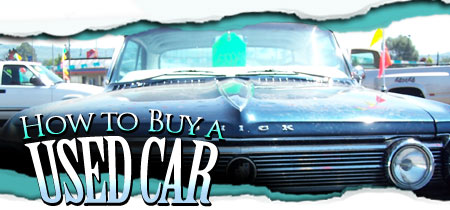
Buying a Used Car: Problem Prevention
Spoken
Promises
The
buyer's guide cautions you not to rely on spoken promises.
They are difficult to enforce because there may not
be any way for a court to determine with any confidence
what was said. Get all promises written into the guide.
Pre-Purchase
Independent Inspection
It's
best to have any used car inspected by an independent
mechanic before you buy it. For about $100 or less,
you'll get a general indication of the mechanical condition
of the vehicle. An inspection is a good idea even if
the car has been "certified" and inspected
by the dealer and is being sold with a warranty or service
contract. A mechanical inspection is different from
a safety inspection. Safety inspections usually focus
on conditions that make a car unsafe to drive. They
are not designed to determine the overall reliability
or mechanical condition of a vehicle.
 |
To
find a pre-purchase inspection facility, check your
Yellow Pages under "Automotive Diagnostic Service"
or ask for referrals. Look for facilities that display
certifications like an Automotive Service Excellence
(ASE) seal. Certification indicates that some or all
of the technicians meet basic standards of knowledge
and competence in specific technical areas. Make sure
the certifications are current, but remember that certification
alone is no guarantee of good or honest work. Also ask
to see current licenses if state or local law requires
such facilities to be licensed or registered. Check
with your state Attorney General's office or local consumer
protection agency to find out whether there's a record
of complaints about particular facilities.
There
are no standard operating procedures for pre-purchase
inspections. Ask what the inspection includes, how long
it takes, and how much it costs. Get this information
in writing.
If
the dealer won't let you take the car off the lot, perhaps
because of insurance restrictions, you may be able to
find a mobile inspection service that will go to the
dealer. If that's not an option, ask the dealer to have
the car inspected at a facility you designate. You will
have to pay the inspection fee.
Once
the vehicle has been inspected, ask the mechanic for
a written report with a cost estimate for all necessary
repairs. Be sure the report includes the vehicle's make,
model and VIN. Make sure you understand every item.
If you decide to make a purchase offer to the dealer
after considering the inspection's results, you can
use the estimated repair costs to negotiate the vehicle
price.
Vehicle
Systems
The
buyer's guide lists an auto's 14 major systems and some
serious problems that may occur in each. This list may
help you and your mechanic evaluate the mechanical condition
of the vehicle. The list also may help you compare warranties
offered on different cars or by different dealers.
Dealer
Identification & Consumer Complaint Info
The
back of the buyer's guide lists the name and address
of the dealership. It also gives the name and telephone
number of the person you should contact at the dealership
if you have problems or complaints after the sale.
Optional
Signature Line
The
dealer may include a buyer's signature line at the bottom
of the buyer's guide. If the line is included, the following
statement must be written or printed close to it: "I
hereby acknowledge receipt of the buyer's guide at the
closing of this sale." Your signature means you
received the buyer's guide at closing. It does not mean
that the dealer complied with other requirements,
such as posting a buyer's guide in all the vehicles offered
for sale.
Spanish
Language Sales
If
you buy a used car and the sales discussion is conducted
in Spanish, you are entitled to see and keep a Spanish-language
version of the buyer's guide.
Private
Sales
An
alternative to buying from a dealer is buying from an
individual. You may see ads in newspapers, on bulletin
boards or on a car. Buying a car from a private party
is very different from buying a car from a dealer.
Private
sellers generally are not covered by the Used Car Rule
and don't have to use the buyer's guide. However, you
can use the guide's list of an auto's major systems
as a shopping tool. You also can ask the seller if you
can have the vehicle inspected by your mechanic.
Private
sales usually are not covered by the "implied warranties"
of state law. That means a private sale probably will
be on an "as is" basis, unless your purchase
agreement with the seller specifically states otherwise.
If you have a written contract, the seller must live
up to the promises stated in the contract. The car also
may be covered by a manufacturer's warranty or a separately
purchased service contract. However, warranties and
service contracts may not be transferable, and other
limits or costs may apply. Before you buy the car, ask
to review its warranty or service contract.
Many
states do not require individuals to ensure that their
vehicles will pass state inspection or carry a minimum
warranty before they offer them for sale. Ask your state
Attorney General's office or consumer protection
agency about the requirements in your state.
Before You Buy a Used Car
No
matter who you buy a used car from, follow these tips
to learn as much as you can about the car:
-
Examine
the car yourself using an inspection checklist. You
can find a checklist in many of the magazine articles,
books and Internet sites that deal with buying a used
car.
-
Test
drive the car under varied road conditions — on hills,
highways and in stop-and-go traffic.
-
Ask
for the car's maintenance record. If the owner doesn't
have copies, contact the dealership or repair shop
where the work was done. They may share their
files with you.
-
Talk
to the previous owner, especially if the present owner
is unfamiliar with the car's history.
-
Have
the car inspected by a mechanic you hire.
If You Have Problems
If
you have a problem that you think is covered by a warranty
or service contract, follow the instructions to get
service. If a dispute arises, there are several steps
you can take:
-
Try
to work it out with the dealer. Talk with the salesperson
or the owner of the dealership. Many
problems can be resolved this way. However, if
you believe you're entitled to service, but the dealer
disagrees, you can take other steps.
-
If
your warranty is backed by a car manufacturer, contact
the local representative of the manufacturer. The
local or zone representative is authorized to adjust
and decide about warranty service and repairs to satisfy
customers. Some manufacturers are willing to repair
certain problems in specific models for free, even
if the manufacturer's warranty does not cover the
problem. Ask the manufacturer's zone representative
or the service department of a franchised dealership
that sells your car model if there is such a
policy.
-
Contact
your local Better Business Bureau, state Attorney
General, or the Department of Motor Vehicles. You
also might consider using a dispute resolution organization
to arbitrate your disagreement if you and the dealer
are willing. Under the terms of many warranties, this
may be a required first step before you can sue the
dealer or manufacturer. Check your warranty to see
if this is the case. If you bought your car from a
franchised dealer, you may be able to seek mediation
through the Automotive Consumer Action Program (AUTOCAP),
a dispute resolution program coordinated nationally
by the National Automobile Dealers Association and
sponsored through state and local dealer associations
in many cities. Check with the dealer association
in your area to see if they operate a mediation program.
-
If
none of these steps is successful, small claims court
is an option. Here, you can resolve disputes involving
small amounts of money, often without an attorney.
The clerk of your local small claims court can tell
you how to file a suit and what the dollar limit is
in your state.
-
The
Magnuson-Moss Warranty Act also may be helpful. Under
this federal law, you can sue based on breach of express
warranties, implied warranties, or a service contract.
If successful, consumers can recover reasonable attorneys'
fees and court costs. A lawyer can advise you
if this applies.
(Source: www.ftc.gov) |